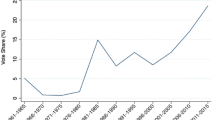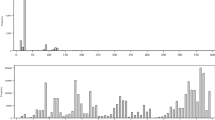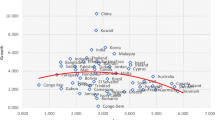Abstract
After disentangling presidential budget proposals from budgetary changes attributable to fluctuations in the economy and to congressional action, we find consistent evidence for a presidential macroeconomic policy cycle attuned to the elctoral cycle. Proposed budgets are more expansionary in election years than at other times. The Congress, however, also plays a significant role in determining fiscal outcomes. Its budgets are systematically related to those of the President and in general reinforce presidential efforts to respond to the electoral cycle.
Although Presidents generally propose quite conservative budgets, their proposals are more expansionary in presidential election years than in other years. The Congress, which generally adopts an expansionary fiscal policy ratifies this proposed macroeconomic policy electoral cycle by adopting even more expansionary budgets in presidential election years than they do at other times.
Similar content being viewed by others
References
Alt, J.E., and Chrystal, K.A. (1983). Political economics. Berkeley and Los Angeles: University of California Press.
Barro, R.J. (1974). Are government bonds net wealth? Journal of Political Economy 82: 1095–1117.
Blinder, A.S. and Solow, R.M. (1974). Analytical foundations of fiscal policy. In A.S. Blinder and R.M. Solow et al. (Eds.), The economics of public finance. Washington, DC: The Brookings Institution.
Buchanan, J.M., and Wagner R.E. (1977). Democracy in deficit: The political legacy of Lord Keynes. New York: Academic Press.
DeLeeuw, F., et al. (1980), The high employment budget: New estimates, 1955–80. Survey of Current Business 60: 13–43.
DeLeeuw, F., and Holloway T.M. (1982). The high employment budget: Revised estimates and automatic inflation effects. Survey of Current Business 62: 21–33.
Fair, R.C. (1978). The effect of economic events on votes for president. The Review of Economics and Statistics 60: 159–173.
Fiorina, M. (1977). Congress: Keystone of the Washington establishment. New Haven, CT: Yale University Press.
Fiorina, M. (1981). Short- and long-term effects of economic conditions on individual voting decisions. In D.A. Hibbs, Jr., and H. Fassbender (Eds.), Contemporary political economy. Amsterdam: North Holland.
Fischer, G.W., and Kamlet, M.S. (1984). Explaining presidential priorities: The competing aspiration levels model of macrobudgetary decision making. The American Political Science Review 78: 356–371.
Frey, B.S., and Schneider, F. (1978). An empirical study of politico-economic interaction in the United States. The Review of Economics and Statistics 60: 174–183.
Frey, B.S., and Schneider, F. (1981). Recent research on empirical politico-economic models. In D.A. Hibbs, Jr. and H. Fassbender (Eds.), Contemporary political economy. Amsterdam: North Holland.
Golden, D.G., and Poterba, J.M. (1980). The price of popularity: The political business cycle reexamined. American Journal of Political Science 60: 696–714.
Hibbs, D.A., Jr. (1977). Political parties and macroeconomic policy. American Political Science Review 71: 1467–1487.
Hibbs, D.A., Jr., and Fassbender, H. (1981). Contemporary political economy. Amsterdam: North-Holland.
Hicks, A. (1984). Elections, Keynes, bureaucracy and class: Explaining U.S. budget deficits, 1961–1978. American Sociological Review 49: 165–182.
Kamlet, M.S., and Mowery, D.C. (1985). Economic, political and institutional influences on executive and congressional budgetary priorities, 1953–1981. Mimeo.
Kiewit, R.D., and McCubbins, M.D. The effect of economic conditions, parties, and elections upon the congressional appropriations process. Mimeo. 35 pp.
Kiewit, R.D. (1983). Macroeconomics & micropolitics: The electoral effects of economic issues. Chicago: The University of Chicago Press.
Lindbeck, A. (1976). Stabilization policies in open economies with endogenous politicians. American Economic Review 66: 1–19.
MacRae, C.D. (1977). A political model of the business cycle. Journal of Political Economy 85: 239–264.
Nordhaus, W.D. (1975). The political business cycle. Review of Economic Studies 42: 169–189.
Ornstein, N.J. (1985). The politics of the deficit. In Philip Cagan (Ed.), Contemporary economic problems: the economy in deficit. Washington, DC: The American Enterprise Institute.
Pack, J. (1986). The congress and fiscal policy. Mimeo. 29 pp.
Schick, A. (1980). Congress and money: budgeting, spending and taxing. Washington, DC: The Urban Institute.
Shuman, H.E. (1984). Politics & the budget: The struggle between the president and the congress. Englewood Cliffs NJ: Prentice-Hall.
Tobin, J. (1980). Asset accumulation and economic activity. Chicago, IL: University of Chicago Press.
Tufte, E.R. (1978). Political control of the economy. Princeton, NJ: Princeton University Press.
Author information
Authors and Affiliations
Additional information
Paul Burnham's research assistance is gratefully acknowledged. He not only performed the routine chores of data gathering and processing but did both with a critical eye which often made substantive difference. My colleagues Arthur Frank, Charles Gilbert, Jack Nagel, and Paul Quirk were generous with their time, providing important references and detailed comments on earlier versions of the paper. Howard Pack has been an insightful critic at all stages of the work.
Rights and permissions
About this article
Cite this article
Pack, J.R. The political policy cycle: Presidential effort vs. presidential control. Public Choice 54, 231–259 (1987). https://doi.org/10.1007/BF00125648
Issue Date:
DOI: https://doi.org/10.1007/BF00125648




